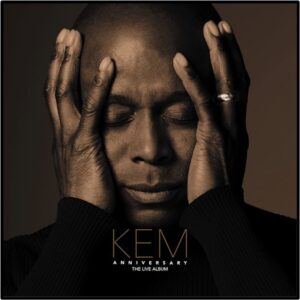Two SoulTracks readers recently had a short online debate about the term “diva.” One used it as a compliment for a female singer who he felt had classic soul qualities, while the other considered the term an insult that described instead a petulant, self-centered artist. In either case, the label didn’t quite seem to work for Terisa Griffin, as it didn’t capture what this Chicago-based dynamo brings to the table as a singer/songwriter and as a visionary in how she presents her “brand” to the world. Griffin has consciously created a visual presentation of herself that is aggressively glamorous, with a richness not found in a typical independent artist, and that aura is just as present in her lush, dramatic music. She is at once a thoroughly modern indie artist with her own label while at the same time a throwback to the elegant glamour that Phyllis Hyman and Anita Baker represented a quarter century ago. Consequently, while many modern artists attempt to stand out from the crowd by pushing the boundaries of shock ever further, Griffin stands out by harkening back to the larger-than-life singers who were often called “divas” back in the day.
Griffin brings all those elements – what she calls her “personalities” – to the first of her two 2011 releases, Soulzophrenic. The cover of Soulzophrenic shows Griffin as five different singers, each with a different look and personality. There is a risk when an artist spends so much energy on the packaging and theme of a release that it is simply a diversion, a shiny object designed to keep us from focusing on the less-than-compelling content beneath. But behind the outsized persona that dominates the cover of Soulzophrenic is a key element that has always prevented Griffin from being seen as a sideshow: the woman can flat out sing.
When Griffin broke out on her 2006 disc, My Naked Soul, she showed she had the pipes – enough to gather a sizeable following in both the US and Europe – but she was not as developed as a songwriter, and the disc had both great moments and telltale signs of a composer who wasn’t quite there yet. On Soulzophrenic, Griffin shows just how far she’s come as a songwriter in five years; her songs aren’t necessarily filled with radio hooks, but they absolutely work, the twelve tracks creating both a musical vibe and a lyrical story that make them more powerful as a group than individually. There are still a few points where the compositions seem underdeveloped, but strong production and Griffin’s performances more than salvage cuts like “Over and Over.” However, the majority of the disc shows Griffin has developed into a complete package as a singer and songwriter, particularly on excellent tracks like the midtempo “This Time I’ll Be Sweeter,” the dramatically beautiful ballad “What About You,” the disc’s fine opening track, “You Got Me” and the club dance number that closes out the album, “I Can See Through It All.”
Noted producers Toxic, Terry Hunter and Maurice Joshua bring with them a sound that fits Terisa Griffin’s vision nearly perfectly. On Soulzophrenic, Griffin covers a lot of territory lyrically, from faith to physical abuse to romantic love found and lost, and each song captures its topic — with a depth of instrumentation not typically found in an independent release — and gives Griffin sufficient room to take it vocally where she wants. And this strong, soulful singer takes it from there.
It has been a half decade since Terisa Griffin made her mark on the soul scene with My Naked Soul, and the intervening years have brought with it a movement by many indie soul artists toward a sound that borrows more from hip hop influences than from the classic soul that inspired them during the middle part of the last decade. If anything, that sea change makes a disc like Soulzophrenic stand out that much more – and likely appeal more to adult soul audiences. Griffin shows that in those same years she’s grown into a complete artist, now displaying the elegant side of soul in a way that few artists in 2011 can. If, to answer the reader debate, a singer who focuses on classic sounds and glamorous looks – and delivers the goods – is a “diva,” then we’ll surely give Terisa Griffin that label. And we’ll just as surely admit that we could use a few more “divas” like her. Recommended.
By Chris Rizik









